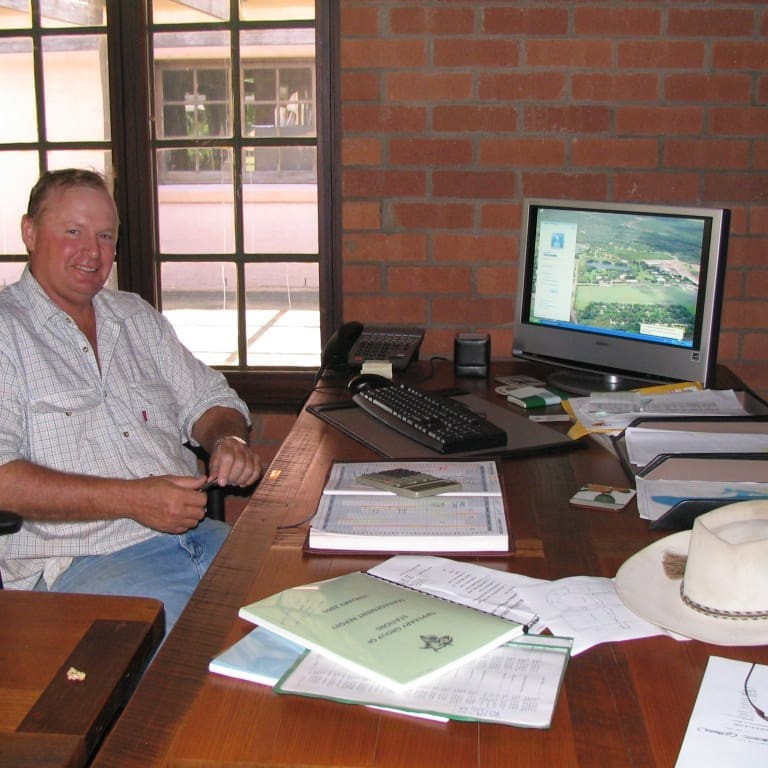 Top End cattleman David Warriner says the heavy reliance on a single market and the continual decline in terms of trade are the major challenges facing northern producers as he embarks on his first year as president of the NT Cattleman's Association.
Top End cattleman David Warriner says the heavy reliance on a single market and the continual decline in terms of trade are the major challenges facing northern producers as he embarks on his first year as president of the NT Cattleman's Association.
While most NT producers are enjoying favourable seasonal conditions as the annual dry season mustering and marketing window opens, the hangover of big market changes in Indonesia and ever-increasing costs were taking a toll.
“I don’t think anyone could come out and say they are looking at a good 12 months just past, or a good 12 months going ahead,” he told Beef Central after being elected president.
“It’s pretty tough out there.
“The costs have gone up, Governments are imposing a lot of regulation on us for various political reasons, and obviously the carbon tax will have a profound impact on our cost dynamics, so our situation is getting pretty grim in a lot of cases.”
Well before last year’s Indonesian trade suspension and quota cutbacks, the imposition of maximum 350kg weight limits by the market in mid-2010 severely affected northern producer returns. The decision effectively meant that producers had to add $250 in freight costs to any animal above that weight to truck them to alternative markets in southern and eastern Australia.
“What profit we were making was severely eroded by that and we haven’t rectified that by any means,” Mr Warriner said.
Mr Warriner’s predecessor Rohan Sullivan also spoke about the difficult conditions facing the northern industry in his outgoing address as president.
He said Indonesia’s decision to halve import quotas in 2012 was “a major blow to confidence".
The northern industry needed greater options, such as the northern abattoir AA Co was seeking Government support to build, he said, because the current situation was unsustainable.
The cost of killing cattle in southern Australia was $340 a head, compared to $150 in the US and about $30 in Indonesia. The carbon tax was projected to add a further $20 a head to processing costs in Australia, while rising AQIS fees were adding to the pressure.
“When you add the regulatory burden of stringent food safety requirements and meat inspection to factors such as lack of skills, high labour costs and low productivity made worse by the Fair Work Act; beef markets in Japan and Korea coming under extreme pressure from US competition and with the $A being above parity with the $US, Australia risks being globally uncompetitive if it is not already,” Mr Sullivan said.
“…The bottom line is that we need something else because the current situation is not sustainable.
“The model of sending cattle huge distances to slaughter is a cost recovery exercise at best, and given the inevitable rise in transport costs from both fuel prices, government regulation of the transport industry and in a couple of years, the carbon tax, it is not going to stack up any better in future.”
Mr Sullivan asked why the Government should not kick the can to help AA Co build a northern abattoir when it had provided $278m in support for General Motors over 10 years and gave $20m to Indonesia over four years to develop their own industry.
Mr Warriner said the NTCA was used to punching above its weight and would continue to highlight the importance of the northern cattle trade and the challenges it faces to political leaders around the country.
“I think the NTCA, pound for pound, achieves more than most,” Mr Warriner said.
“We need to be part of every good story about the country from which we make our living and we need to improve the bush’s relationship with city dwellers.
“The political landscape is certainly not in our favour if we don’t have the broader population’s ear.”
Mr Warriner’s family is part of the fabric of the Northern Territory cattle industry and he has personally experienced its highs and lows.
Born in Alice Springs, Mr Warriner learned the ropes as a jackeroo in the Top End with Consolidated Pastoral Company. He worked his way up to Pastoral Inspector before establishing his own agribusiness consultancy. With his wife Gina and three children, Mr Warriner has lived at the picturesque Tipperary Station in the Daly River region south west of Darwin.
